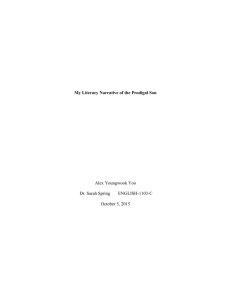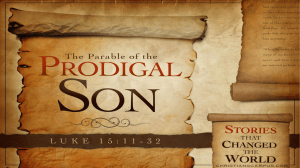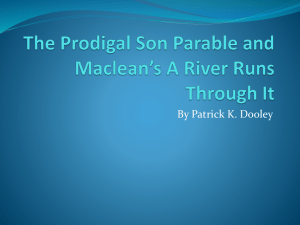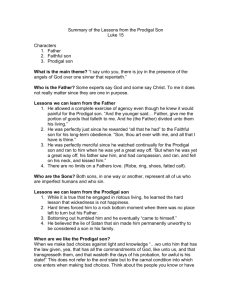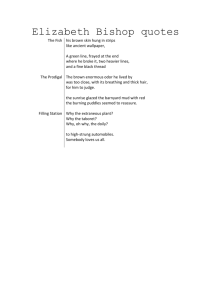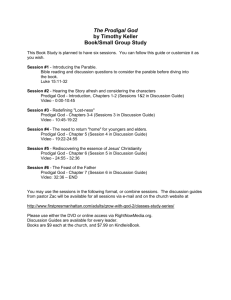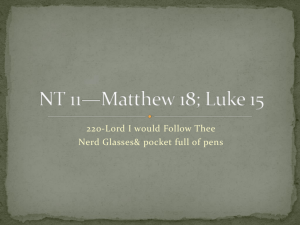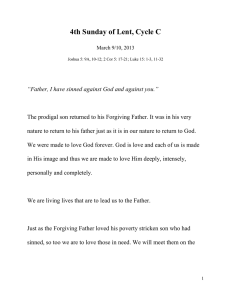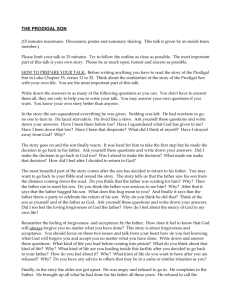The Prodigal Son
advertisement
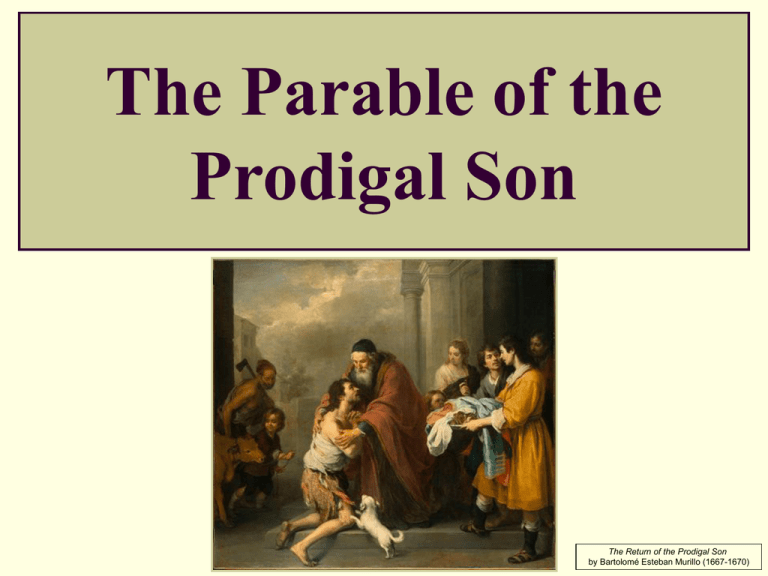
The Parable of the Prodigal Son The Return of the Prodigal Son by Bartolomé Esteban Murillo (1667-1670) DEFINITIONS PARABLE Definition: a brief, concise story that teaches a lesson anecdotal (on-point, to instruct) often ethical or spiritual dictionary.com: “a short allegorical story designed to illustrate or teach some truth, religious principle, or moral lesson” PRODIGAL (1) wasteful exceedingly & recklessly wasteful spendthrift, wastrel (2) extremely generous CONTEXT CONTEXT 1st century BC Pharisees & Scribes often opposed to Jesus because he found their traditions & teachings inadequate; were “lovers of money” [16.14]) complained that Jesus was a man of loose morals: “This man receives sinners and eats with them” (15.2) tax collectors & sinners against the conversion (redemption) of Gentiles? CONTEXT Jesus’ response = Parable of the Lost Sheep (15.3-7), Parable of the Lost Coin (15.8-10), and Parable of the Prodigal Son CONTEXT followed by the Parable of the Dishonest Manager 16.10 “One who is faithful in a very little is also faithful in much, and one who is dishonest in a very little is also dishonest in much. 11 If then you have not been faithful in the unrighteous wealth, who will entrust to you the true riches? 12 And if you have not been faithful in that which is another's, who will give you that which is your own? 13 No servant can serve two masters, for either he will hate the one and love the other, or he will be devoted to the one and despise the other. You cannot serve God and money.” SWINE Jews & Moslems do not eat pork vegetarians (swine, calf) disgust – at his reduced to feeding pigs & his envy of the swine SWINE PULP FICTION on pigs: Vincent: Want some bacon? Jules: No man, I don't eat pork. Vincent: Are you Jewish? Jules: Nah, I ain't Jewish, I just don't dig on swine, that's all. Vincent: Why not? Jules: Pigs are filthy animals. I don't eat filthy animals. Vincent: Bacon tastes gooood. Pork chops taste gooood. Jules: Hey, sewer rat may taste like pumpkin pie, but I'd never know 'cause I wouldn't eat the filthy motherf***er. Pigs sleep and root in sh*t. That's a filthy animal. I ain't eat nothin' that ain't got sense enough to disregard its own feces. Vincent: How about a dog? Dogs eats its own feces. Jules: I don't eat dog either. Vincent: Yeah, but do you consider a dog to be a filthy animal? Jules: I wouldn't go so far as to call a dog filthy but they're definitely dirty. But, a dog's got personality. Personality goes a long way. Vincent: Ah, so by that rationale, if a pig had a better personality, he would cease to be a filthy animal. Is that true? Jules: Well we'd have to be talkin' about one charming motherf***in' pig. I mean he'd have to be ten times more charmin' than that Arnold on Green Acres, you know what I'm sayin'? LUKE Gospel of Luke, book of Acts of the Apostles (sequel) often called Luke-Acts, as 1 book Greek (Lucanus?) Gentile Christian (only one as writer in NT) non-Christian, but familiar w/Jewish customs, OT Greek companion of the Apostle Paul (witnessed Paul’s many arrests, beatings) LUKE historian , medical doctor by profession (maybe) educated attention to detail, recording events & dates scientific, orderly approach carefully researched events “eyewitnesses and servants of the word” (1:2) interviews & preachings of the apostles (close with Paul) LUKE artist “painter in words” descriptive, visual most literary of the Gospels LUKE -- Gospel @ AD 60 (written in Rome?) 3rd Gospel one of the 3 “Synoptic Gospels” (Matthew, Mark and Luke) a defense of Christianity apologia LUKE -- Gospel style styles – formal, classical prose; racy narrative in vernacular; semitic “Bible Greek” logical, orderly literary excellence, poetic, description, eye to detail a human, sensitive, compassionate Jesus interested in people over ideas/ideology LUKE -- Gospel themes humanity of Jesus perfectness of Jesus (perfect man, perfect sacrifice, perfect savior) Jesus’ love of people Jesus’ compassion for the sinful, sick, poor emphasis to prayer, angels, miracles women have important place in the book (1) universality, recognition of Gentiles as well as Jews in God’s plan (2:30–32); (2) emphasis on prayer, especially Jesus’ praying before important occasions (see note on 3:21); (3) joy at the announcement of the gospel or “good news”; (4) special concern for the role of women (8:1–3); (5) special interest in the poor; (6) concern for sinners; (7) stress on the family circle (Jesus’ activity included men, women and children, with the setting frequently in the home); (8) repeated use of the Messianic title “Son of Man” (used 25 times); (9) emphasis on the Holy Spirit; (10) inclusion of more parables than any other Gospel; (11) emphasis on praising God (1:64; 24:53). LUKE -- Gospel 1) Birth, 2) Ministry, 3) Death & Resurrection of Jesus stories NOT in other parts of the Bible (New to Luke) Zachariah’s vision angels & shepherds at Jesus’ birth child Jesus in the temple Parable of the Good Samaritan Parable of the Prodigal Son ARTISTRY ARTISTRY sparse narrative details would get in the way makes you think @ lessons apply it to your own time, situation gives it universality comparison & contrast of sons: Younger goes, Elder stays Younger = physically & emotionally distant, Elder = physically near but emotionally/ spiritually distant Younger repents, Elder does not “get it” Both = spiritually lost ARTISTRY process-analysis: How to repent How to forgive open-ended ending: Does the Prodigal “get it”? Does the Elder Son “get it”? subtle: “this thy son” vs. “this thy brother” PLOT PLOT premature inheritance far off land “riotous living” all spent famine over land desperation, starvation takes job as pig feeder pigs = fed better than he (husks of corn) no one would help him “came to himself” realization repentance goes home (to be a servant) welcomed father’s “compassion” – already forgiven given food, clothes ring, shoes, fatted calf Elder Brother working in field hears music & dancing jealous, angry GREAT LINES LINES 17 And when he came to himself, 18 Father, I have sinned against heaven, and before thee, 19 And am no more worthy to be called thy son: make me as one of thy hired servants. 23 And bring hither the fatted calf, and kill it; and let us eat, and be merry: 24 For this my son was dead, and is alive again; he was lost, and is found. 29 And he answering said to his father, Lo, these many years do I serve thee, neither transgressed I at any time thy commandment: and yet thou never gavest me a kid, that I might make merry with my friends: 30 But as soon as this thy son was come, which hath devoured thy living with harlots, thou hast killed for him the fatted calf. 31 And he said unto him, Son, thou art ever with me, and all that I have is thine. 32 It was meet that we should make merry, and be glad: for this thy brother was dead, and is alive again; and was lost, and is found. CHARACTERS PRODIGAL SON symbolizes all of Fallen Mankind symbolizes each individual sinner demonstrates the path of repentance PRODIGAL SON his request of premature inheritance = mankind’s will (thoughts, desires), will to follow own will over God’s his fall = demonstrates the natural state of unregenerate mankind = toward lust, greed, wastefulness, extravagance alienation from God without God, we squander & become lost grow hungry – cannot be sated by swinish pods (other gods/religions or materialism) descend into futility, darkness, humiliation ELDER SON his sins = self-righteousness lack of forgiveness hard-heartedness lack of brotherly love, forgiveness lack of compassion disowns brother symbolizes the Pharisees, scribes envy self-conceit, self-importance, pride, vanity, arrogance, snobbery, self-satisfaction ELDER SON justified? blind to his father’s love, to imputed grace, to the gifts he has & has always had misses the point could have had a “party” w/ a fatted calf any time he wanted should be happy for his brother’s return should rejoice in his brother’s redemption/repentance should forgive his brother’s transgressions should realize it could have been him (“there but for the grace of God go I”) ELDER SON self-serving service: does good to get noticed, appreciated not virtue for virtue’s sake BUT for some reward do good not b/c it’s the right thing to do but b/c it gets a reward, attention attention-seeking behavior actions, duty without heart see “Say Yes” ELDER SON Father goes out to him, too He = a “prodigal” or lost son, too He = needs to learn a lesson, too He needs some humilty FATHER Negative father = too prodigal with his love, money, property father gave the money prematurely (-) father accepted son back too easily son’s confession = rehearsed way of evading responsibility of his error/prodigality ending = father returning (ignorantly) to his original error father has learned nothing younger son has learned nothing (got away with it, will again) elder son has learned to be unrighteous, prodigal FATHER Positive gives all he has gives inheritance prematurely (before it’s due) gives unconditional love accepts younger son without explanation, repentance, excuses, … celebrates the son’s return - homecoming Prodigal with his love goes out to Prodigal Son goes out to Elder Son complete, underserved forgiveness THEMES THEMES Forgiveness “compassion” already forgiven - forget @ past THEMES Forgiveness Of self, siblings, family members Of others (sinners, human beings) Of sins washes away all past sins past = forgotten, not brought up again, not used as a weapon Forgiveness = complete not half-hearted, no resentments total, fresh start “forgive & forget” THEMES Family Welcoming, forgiving Religion How to repent How to treat, accept sinners answer to Pharisees, Scribes Welcoming, forgiving THEMES Repentance gradual, inner process (1) consciousness of one’s fall (2) sincere remorse (3) humble turning to God THEMES Hope possibility for change not stuck in hopeless situation not abandoned, left in sin, in despair our will got us in to this mess, will to change/repent gets us out God will forgive if we repent & return home God is waiting for/watching for us “at home” someone is waiting, welcoming THEMES Humanity: what it means to be human these are humans acting human each of us has the capability of prodigality, wastefulness, materialism unregenerate, fallen state sin, sinning fall from grace, disgrace despair, isolation, alienation compassion, forgiveness envy, jealousy, self-righteousness, pride inability to forgive blindness to our gifts THEMES Unconditional love (imputed, undeserved grace) Fatherhood Fatherly love Brotherly love Fairness Loyalty Work Profligacy, prodigality, wastefulness, recklessness Wages of sin Anti-materialism LITERARY THEORY Allegory Tragedy Apologia Deconstruction Feminism ALLEGORY (medieval allegorizations) Father = God Elder = Pharisees & teachers who resented the conversions of the Gentiles (sinners) Elder in field = Pharisees’ distance/remoteness from God’s grace Prodigal = Gentiles, wandered in illusions, served the devil, tended to demons Swine owners = Devil Swine = demons Husks (eaten by pigs) = vices (which cannot satisfy) & pagan literature (cannot satisfy) Father’s going to meet Prodigal = the Incarnation Father’s falling on Prodigal’s neck = the gentle yoke of Christ (Matthew 11.29-30) Music (heard by Elder) = praise of God Feast of fatted calf = Eucharist ALLEGORY (possible allegorization) Father = God Elder = Lucifer, angels Prodigal = humanity (with free will, fall & redemption) TRAGEDY Aristotle: “‘Tragedy, then, is an imitation of an action that is serious, complete, and of a certain magnitude; in language embellished with each kind of artistic ornament, the several kinds being found in separate parts of the play; in the form of action, not of narrative; with incidents arousing pity and fear, wherewith to accomplish its katharsis of such emotions.[ . . .] Every Tragedy, therefore, must have six parts, which parts determine its quality—namely, Plot, Characters, Diction, Thought, Spectacle, Melody.’” change in fortune, fall from grace, tragic flaw/error (BUT tragic flaw = usually NOT a vice, as the Prodigal Son’s is) recognition, realization conflict, climax, complication (Elder?), resolution protagonist = high social standing (renowned, prosperous), reversal of fortune characters = true to life & believable, true to their character/consistent, tragic-comedy fall recognition recovery/restoration, welcome (happy ending) APOLOGIA Defense of Christianity: addressed to Roman official, Theophilus only NT book meant for an audience outside the Christian community shows religion in a good light Jesus not as rebel, troublemaker it’s not superstition DECONSTRUCTION DECONSTRUCTIONISM Because it’s a parable sparse by its nature doesn’t tell us how to interpret doesn’t spell everything out readers can use its ambivalence it out to create alternate interpretations fill in the gaps in the text use the same words to create an alternate reading FEMINISM No female characters No wife/mother Only women referenced in the story = harlots FEMINISM Is Jesus being sexist? Was Luke? Were the Church Fathers? Would the story be different if “Prodigal Daughter” or mother of 2 sons? refuted by The Gospel of Luke only Gospel that gives an important role to women in Jesus’ life Jesus’ followers = Mother Mary, Mary Magdalene, Martha, Mary of Bethany only Gospel with the Annunciation Going TOO Far Allegorizations Tragedy Deconstructionism Feminism Queer Theory MAKING CONNECTIONS OTHER STORIES new starts: self-sacrificing fathers “Prodigal” “Powder” “Clod & Pebble” Fake repentance? “Prodigal” “POWDER”: new snow, covers old tracks/sins, fresh start “Say Yes” “Parable” self-serving service: does good to get noticed, appreciated not virtue for virtue’s sake BUT for some reward attention-seeking behavior actions, duty without heart “Prodigal” “Powder” forgiveness: see “Say Yes” “Prodigal” fatherhood: do good not b/c it’s the right thing to do but b/c it gets a reward, attention “Prodigal” “Say Yes” QUESTIONS QUESTIONS Would this brief parable suffer if it had more details? How would the story be different from the Elder Son’s POV? Does it change the story? Change the message? QUESTIONS Can this story be appreciated by non-Christians? Does their religion change the message? Does the fact that they do not accept the divinity of Jesus alter the story, their view of it? Can they appreciate the moral lessons? Can they appreciate the artistry of the writing? QUESTIONS Does this message change with your age? @ 20 @ 30 @ 40… How can this parable apply to today? Caretakers vs. other siblings Taking over the family business QUESTIONS How does this parable answer the Pharisees? Pharisees = prodigal son Jesus/God = father QUESTIONS How can this be the story of the Prodigal Father? prodigal with his property prodigal with his love father = (-) What are some alternate titles for this parable? How does each change the focus of the story? of Lost Son of Loving Father of Prodigal Father of 2 Sons QUESTIONS Are the Elder Son’s reservations justified? Is the father prodigal with his love? Does the son get the father’s point? Problem with this? stay home, take care of everything, devoted, walk the narrow path, do what are supposed to, live a righteous life the other lives as a wastrel, then repents when he’s lost everything, then all’s forgiven? sin, murder, kill, …then repent on death bed? make everyone else’s life miserable but as long as you repent at the end it’s ok? QUESTIONS Did the Father know that the Prodigal Son would be prodigal? When he gave him the inheritance Did the Father realize that allowing his son to fail was the only to teach him, cure him? self-sacrificing fathers “Prodigal” “Powder” “Clod & Pebble” QUESTIONS Epilogue: Is the Prodigal’s repentance true? He practices, rehearses it? like a speech words without thoughts?? What happens to the older brother? Does he give up the righteous path? Does he become prodigal? Would it be worse if he did (worse than the younger’s wastefulness)? Does he forgive & welcome his younger brother? What happens to the younger/prodigal son? Does he learn his lesson? Does he relapse? Does he take advantage of the father’s love/money? What would happen if the father dies? How the brothers behave? Share? Fight over possessions? Squander money & property? QUESTIONS What is the intended moral? What values does the story promote? Is the father unfair? Do you feel sorry for the prodigal son? Do you feel sorry for the elder son? Or do you feel anger or resentment at his behavior? QUESTIONS How does the story relate to your experiences as a member of a family? What differences of experience are based on gender? Do our attitudes change as we grow older? PIX PIX PIX PIX The Prodigal starring Lana Turner, Edmund Purdom (1955, dir. Richard Thorpe) One critic has noted that The Prodigal was aptly titled, inasmuch as it was all too prodigal with the funds of the thenflagging MGM studios. In its retelling of the 22-verse Biblical story of the Prodigal Son, the film helpfully fills in the story details inconsiderately left out of the Old Testament [sic]. Edmond Purdon plays Micah, the wastrel son of Eli (Walter Hampden) who takes his share of his father's fortune and blows it all in wicked old Damascus. Micah's one redeeming feature is his unserving faithful in the Lord God Jehovah. Pagan princess Samarra (Lana Turner at her most giddily exotic) intends to seduce Micah into renouncing his faith, only to get stoned to death for her troubles. Nearly two hours pass before Micah returns home and the fatted calf is killed in his honor. If for nothing else, The Prodigal would be memorable for Lana Turner's pagan-ritual costume, which is little more than a glorified bikini. ~ Hal Erickson, All Movie Guide QUESTION What would Hollywood do to this story if it made a movie today?
